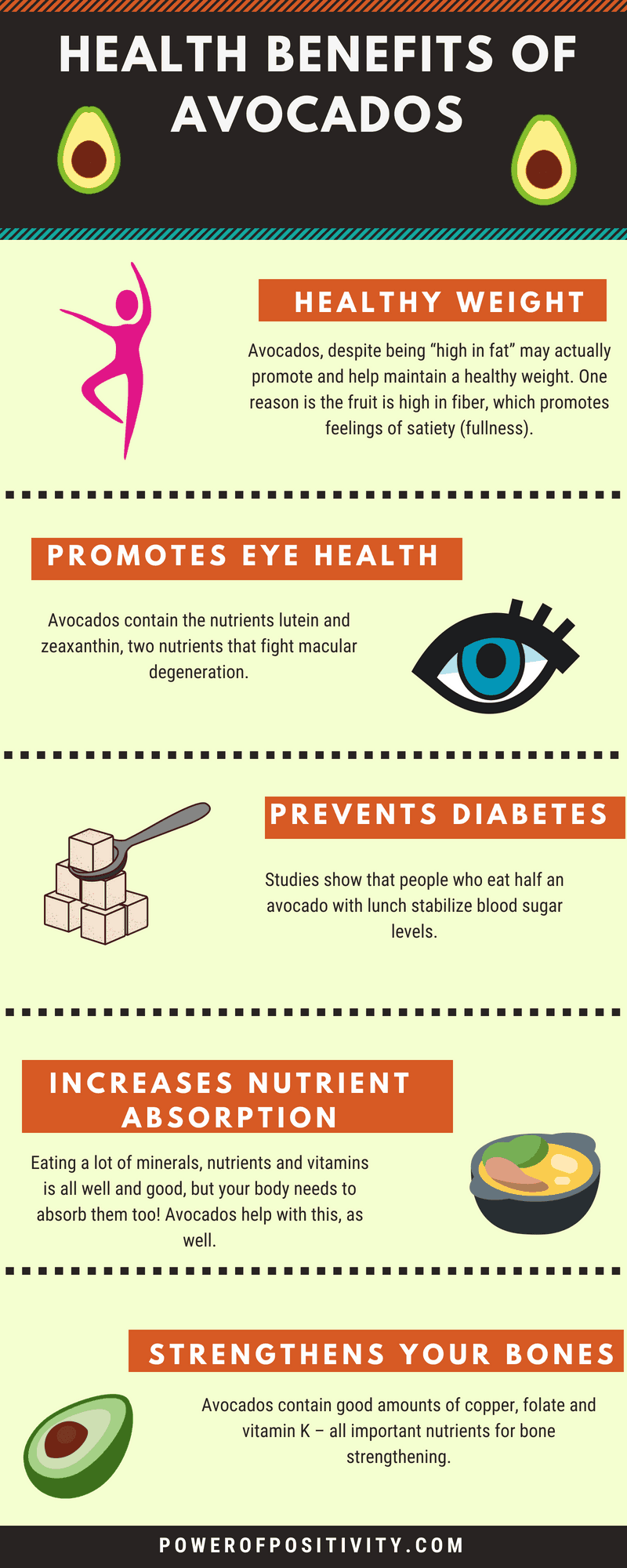“Avocado offers nearly 20 vitamins and minerals in every serving, including potassium, lutein and folate.” – WebMD
Few foods pack a heavier nutritional punch than avocado. Consider that an average avocado contains nearly 1000 mg of potassium (twice as much as a banana), almost 20 essential vitamins and minerals, and 18 amino acids. That’s quite incredible for food just slightly larger than a pear.
What happens to our body when we eat avocado makes it truly unique. The fruit (yes, it is a fruit) helps control blood pressure, maintain eye health and repair cells. As a dense source of B vitamins, they also strengthen the immune system and fight off disease and infection. Plentiful C and E vitamins give avocado their cancer-fighting properties.
Some people will stay away from avocado due to its high-fat content, but this position isn’t logically sound. Avocado does contain significant amounts of fat, but it’s of the healthy fat variety. Monounsaturated fat is beneficial in helping to reduce bad cholesterol levels, which is important in maintaining heart health. Trans and saturated fats are the types that should be strictly limited.
Here’s what happens to your body when you eat one avocado a day:
Avocado also has satiety-producing effects, meaning that we feel fuller more quickly. Any food that is delicious, healthy, and curbs our hunger (as opposed to reaching for more) is rare, and that’s exactly what avocado does. This effect is attributed to the fruit’s healthy fat content, stabilizing insulin and glucose levels while stimulating our metabolism. The cumulative effect is that avocado can aid in weight loss.
Eye health benefits of avocados are achieved through the minerals lutein and zeaxanthin. These nutrients help to improve vision and protect against eye disease macular degeneration. All told, avocados are a terrific food for preventing eye disorders.
Avocado is a rare fruit with a good amount of protein. An average-sized avocado contains approximately four grams of protein, among the highest amount of any food in its class. The protein in an avocado is also high-quality and immediately available, which is not the case for many meat-based protein sources. The protein derived from avocado helps us to: maintain and build muscle, keep our skin healthy, and keep our bones, blood and cartilage healthy.
At 10 grams a serving, avocados are very high in fiber, particularly of the dietary, insoluble type. This type of fiber aids digestive health and bowel regularity. Insoluble fiber does not dissolve water (hence “insoluble”), which means it’s more efficient in moving material through the digestive tract than soluble fiber. Insoluble fiber, such as that found in avocados, can help protect colon health and reduce inflammation. Further, avocado fiber helps regulate blood sugar and cholesterol levels.
The benefits mentioned above only begin to scratch the surface of avocado’s benefits to our health. Almost important as what avocado contains is what it does not. The fruit is low in refined carbohydrates (the fat-producing variety), sugar and sodium.
Here are some additional, less-known health benefits of avocados:
– Helps nutrient absorption.
Due to its rich fat content, avocado helps absorb soluble vitamins A, D, E, and K. When eating with other foods, avocado’s absorption properties ensure that our bodies get the maximum amounts of vitamins and minerals and nutrients derived from those foods.

– Helps ease arthritis symptoms
Avocados contain omega 3 fatty acids, carotenoid antioxidants and phytosterols, all of which help reduce inflammation. These properties are particularly helpful to individuals suffering from arthritis and osteoarthritis pain.
– Reduces the risk of certain cancers
Because of its potent mix of anti-inflammatory and antioxidant agents, avocados can effectively decrease the risk of certain cancer types. The journal Seminars in Cancer Biology published a study in 2007 which discovered that phytochemicals in avocados can inhibit the growth and proliferation of precancerous and cancerous cellular bodies.
– Promotes heart health
The combination of mono- and polyunsaturated fats in avocados helps to reduce the body’s level of cholesterol. In addition, high levels of the B6 vitamin and folic acid regulates homocysteine, which creates a cumulative and interactive effect with an avocado’s healthy fat content. The result is the reduced risk of metabolic syndrome – symptoms that increase the risk of diabetes, stroke and coronary artery disease.

















